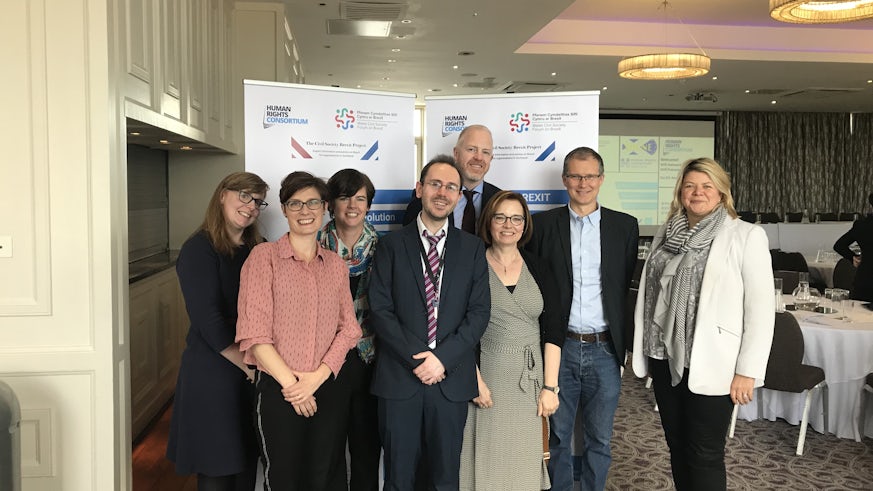Civil society brought together to focus on Brexit challenges
30 May 2019

Charles Whitmore, Coordinator of the Wales Civil Society Forum on Brexit, reports back on this month’s civil society conference in Belfast
For many in civil society discussions around Brexit are seldom a cheerful affair, with concerns ranging from fears around social cohesion and regression of rights and standards, to loss of EU funding in the long term. However, on a positive note, Brexit has acted as a catalyst for cooperation for civil society across the devolved nations.
It was within this backdrop that over 2-3 May 2019, the Wales Civil Society Forum on Brexit, a partnership project between the Wales Governance Centre and WCVA, teamed up with its sister projects in the Human Rights Consortium from Northern Ireland and the Civil Society Brexit Project from Scotland to organise a two-day conference in Belfast funded by the Legal Education Foundation, entitled 'Brexit, Devolution and Civil Society'.
The aim of the two days was to explore and contrast the implications of Brexit for civil society across the devolved nations but perhaps more importantly to also start the conversations on how organisations can work together to understand and shape the post-Brexit landscape, politically, socially, legally and constitutionally.
Taking place at the historic Europa Hotel, the conference hosted at its peak over 100 delegates from civil society, academic and political circles from Wales, Ireland, Scotland and England.
Opening the conference, the Lord Mayor of Belfast, Councillor Deirdre Hargey highlighted that Brexit is one of the biggest impacts in the history of the Island and represents a huge challenge, not just for the Good Friday Agreement and the peace process itself, but also for the human rights and equality standards that were built around the agreement.
Delegates shared many common concerns, from civil society’s inability to plan for Brexit due to the prevailing uncertainty, to the challenges faced by organisations who are already feeling the very real impact of Brexit in their day to day activities, for instance within minority communities or around economic decision making.
Important differences in impact and context were also highlighted throughout, from the citizenship challenges on the island of Ireland, where Brexit interferes with the GFA right to identify as Irish, British or both, and Scotland’s independence movement, to Wales’ particular reliance on EU funding and networks in a context of being the only devolved nation with a Leave majority at the time of the referendum.
In many ways the conference succeeded in providing an opportunity for shared learning – there was interest in Joanna Cherry QC MP’s talk about Scotland’s exploration of using Northern Ireland’s model of citizen’s assemblies to help heal some of the division caused by Brexit.
Ultimately however there were some strong common messages:
- Jeremy Miles AM, the Counsel General and Brexit Minister in Wales was one of many to highlight that Brexit has fundamentally challenged the devolved constitutional arrangements which have been predicated on membership of the European Union. He went so far as to call into question whether these can continue in their current form.
- The importance of the so far under-discussed question of what type of society organisations want to see emerge on the other side of Brexit was also raised many times.
- Finally, delegates agreed that civil society and cross border collaboration have a critical role to play in shaping an answer to this question.
A huge part of this post-Brexit landscape will be negotiating the future relationship with the EU, sometimes referred to as phase two of Brexit. This second phase will be considerably more complex, involve many more issues, and have much more at stake when compared with the Withdrawal Agreement.
And while organisations left the conference on 3 May having expressed great enthusiasm for collaborating around Brexit moving forward, significant challenges were highlighted and remained heavy on people’s minds. The Brexit Civil Society Alliance highlighted in the aftermath of the conference, that to date the UK Government has failed to meaningfully engage with the devolved nations in the first phase of Brexit and this is particularly acute for civil society– something which the Institute for Government has called on the UK Government to remedy.